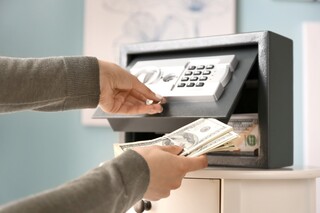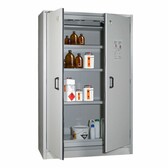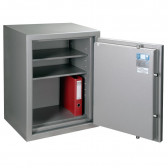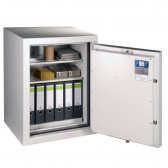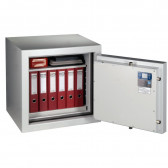We are long past the time when a home safe was a piece of equipment reserved for the most wealthy people and its contents were kilos of gold bars, diamonds in the size of an apple or another Holy Grail. Nowadays we use home safes most often to store documents, a bit of cash, jewellery and, above all, items of sentimental value. Today we will take a brief look at home safes in everyday use.
What are home safes used for?
To begin with, let's consider what in our immediate and everyday surroundings is of value that needs to be guarded.
Valuable items obviously come to mind first, and the list is quite long:
• jewellery,
• numismatic objects,
• watches,
• family heirlooms, photographs or other items of sentimental value,
• obviously, cash.
Another category, much broader, is documents:
• deeds,
• contracts,
• invoices,
• business documents, if you have an office safe at home.
Lately, it has also become increasingly common to keep weapons at home. A safe is needed for this, too.
A home safe, or what kind of safe?
Home safes are a very broad concept and its definition depends very much on personal interpretation and the individual needs of the specific user.
Dimensions
Most commonly, by home safes we mean devices with small dimensions, although for many customers this is so subjective that the term ‘small’ can refer to models with very different capacities. To make things easier, we therefore ask not so much about the preferred dimensions of the safe, but about the cubic capacity of the items stored inside, and then it sometimes turns out that this small safe can be 1 metre high.
Security of the home safe
The security of a safe is based on three factors:
• the burglary resistance class – security, expressed in classes according to European standards, results from the quality of the materials and the time required to break in. Thanks to their robust construction, home safes resist burglary attempts for a long time. Home safes are available in different burglary resistance classes and the higher the class, the better.
• the weight of the safe – the high level of security directly affects the weight of a particular safe. While there are models available that weigh up to 40kg, the real protection against theft will be provided by those that cannot be taken away in a matter of minutes. If a home safe is taken by potential thieves to a safe location, you can be sure that it will be opened sooner or later. We assume that home safes weighing more than 100-150 kg are reasonably safe.
• mounting – according to European standards, any home safe (and more) weighing less than 1000 kg must be permanently mounted to the floor and/or wall. This makes sense: mounting a safe makes it drastically more difficult to remove it during a break-in, and the more robust the construction of such a safe, the better for the items stored.
Maximum security for documents, cash, jewellery or other valuables will be the result of all of the features mentioned above.
What types of home safes are there?
Depending on the intended use we have envisaged for a safe at home, these devices can be classified into several conventional categories:
• furniture safes – the smallest home safes, which are generally used for storing small everyday items such as car keys or petty cash;
• cabinet safes – slightly larger, in keeping with the name to be installed rather in the study where you work. Cabinet safes or office safes come in a variety of sizes and configurations, and are often fireproof safes, especially if they are to be used for document storage;
• strongboxes – these are already large home safes used to keep documents, but also larger amounts of cash. If you have valuable items such as gold bars, numismatic items, valuables or watches, it is also worth thinking about a larger and heavier safe;
• home safes for weapons and ammunition – in recent years we have been arming ourselves at an all-time high, hence questions about safes for storing weapons are becoming more frequent.
Which home safe configuration to choose?
When choosing a safe for your home, you'll be faced with several opportunities that are worth taking a closer look at. You'll find safes to suit your needs without any problems in our range, but we know that sometimes a wide choice of products can be confusing. Therefore, let's briefly answer a few questions:
• What size do you want the safe to be?
• What type of lock do you prefer? There are traditional key locks, mechanical combination locks, electronic locks and even a biometric lock. Electronic locks are by far most commonly chosen due to their ease of use (code).
• What class of security should the safe provide? If you intend to store valuable items in the safe, the class should be higher.
• Do you care about fire resistance? This feature is useful if it is to be an office safe for storing documents.
A bespoke safe
The most valuable items not only require the highest possible level of security but also a unique setting. If you are one of those customers who place unusual demands on a safe and would like to keep valuables in a safe designed especially for you, then the Signature Safes and Exquisite product lines are the ideal solution.
In our bespoke home safes, we combine state-of-the-art technology to ensure the security of valuables and other precious items with a beautiful setting handcrafted from the highest quality materials such as natural veneer, alcantara, leather or glass. We will personalise such a safe as much as possible and you can be sure that we will not make another one like it any time soon.
